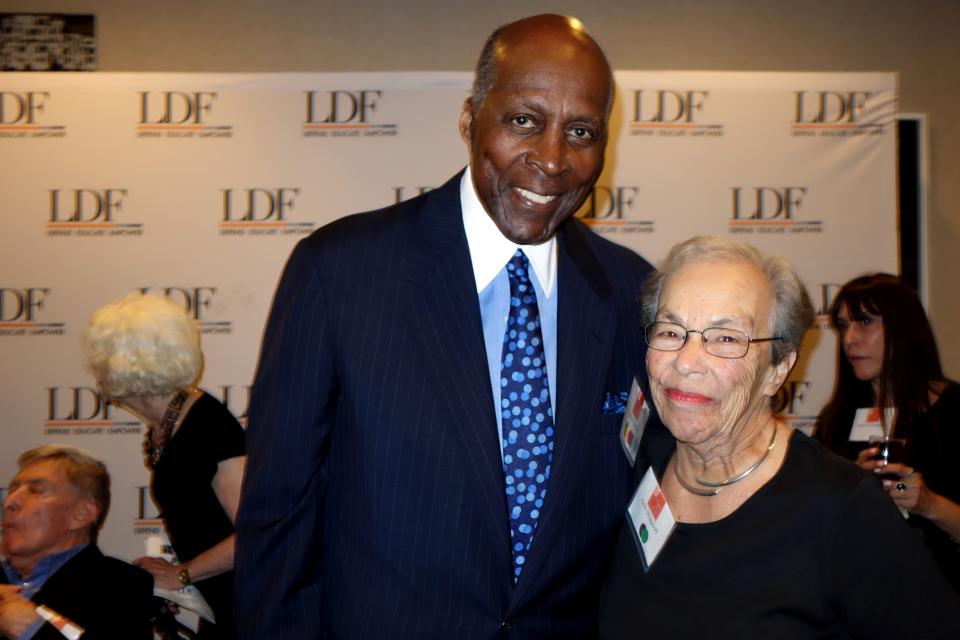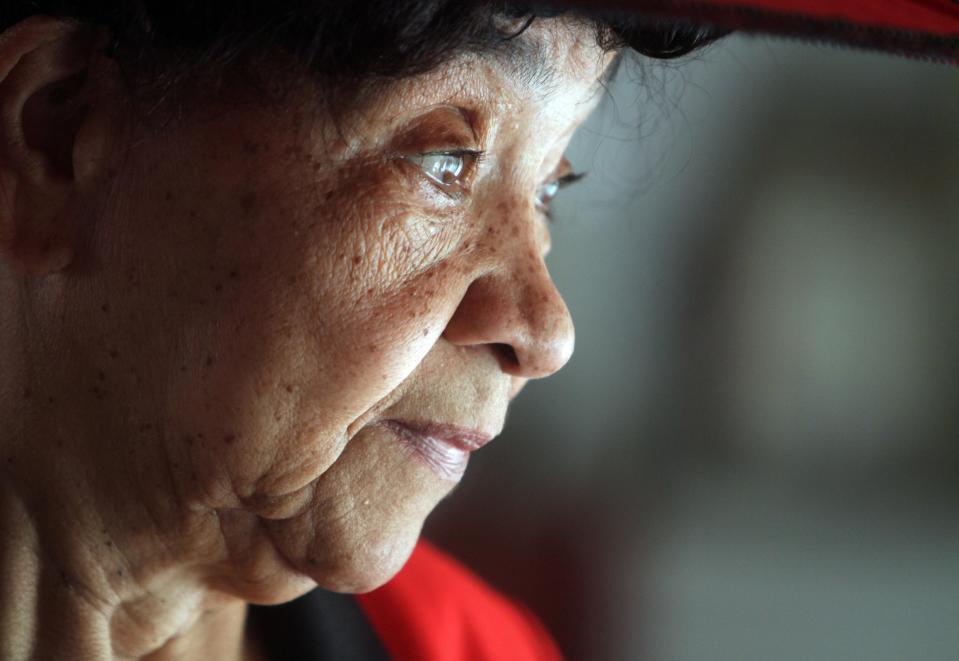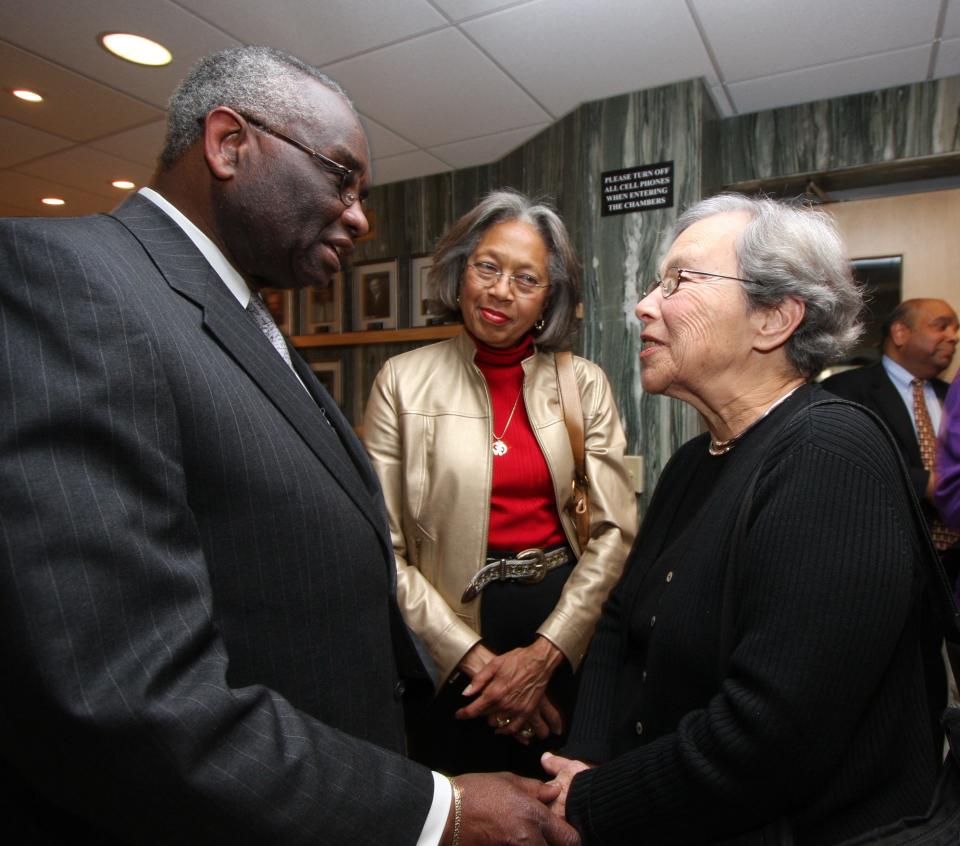Obituary: June Shagaloff Alexander, national civil rights leader who aided Rockland youth
- Oops!Something went wrong.Please try again later.
Civil rights stalwarts nationwide mourned the death of June Shagaloff Alexander, an organizer who started her work with Thurgood Marshall in 1950. Her legacy in Rockland County, where she lived for decades and advocated for children, is also being recalled after she died on March 29 in Tel Aviv at age 93.
"Her historical and social science research played a key role in LDF’s preparation for the successful Brown v. Board of Education arguments before the U.S. Supreme Court," said Ted Shaw, former director-counsel at LDF. "Wherever she went, she did work that reflected her commitment to social, and racial and social justice."
Shagaloff Alexander worked with the NAACP Legal Defense Fund throughout the 1950s.

In 1961, Shagaloff Alexander joined the national NAACP as its first education director. Her focus on discriminatory education policy, centered on school districts in the South and North.
Shaw said her work included going into Westchester, where she worked with New Rochelle parents, who in 1961 won a lawsuit stopping the de facto segregation at the Lincoln School, which was 94% Black.
In the 1970s, she married Michael Alexander and lived for a while in Israel.
Born in Brooklyn, she and her husband moved to Rockland in the early 1980s, living in Bardonia. In 2008, she was inducted into the Rockland County Civil Rights Hall of Fame.
Shaw said Shagaloff Alexander loved Rockland.
Frances Pratt, former president of the Nyack NAACP, said Shagaloff Alexander tackled those same equity issues when she lived in Rockland County.
Rockland work
When Shagaloff Alexander moved to the county, Pratt, a new NAACP president, was eager to appoint her to head the Nyack branch's education chair.
“She really started the ball rolling,” Pratt said on tackling issues that held back Black children in Nyack.

Shagaloff Alexander supported families whose young Black boys were often tracked into special education classes and faced school suspensions at a much higher rate than other children.
Her organizing skills and work with families were impressive, Pratt said. “She was the best thing since sliced bread!”
Longtime West Street Child Care Learning Center Executive Director Diane Rivera met Shagaloff Alexander around 1992. Rivera was a social worker at Head Start in Nyack and Shagaloff Alexander was part of a new project called Caring Homes for Children, which fostered adoptions for children of color with families of color. The program received funding from the Rockland County Department of Social Services, Rivera said.
In 1997, Rivera took the helm of West Street Child Care Learning Center, a Spring Valley-based agency that was struggling. One of Rivera's first and key decisions was to recruit Shagaloff Alexander for the board.
"June worked with me to build the reputation and put in programs," Rivera said, tapping her "expertise and knowledge for being an advocate for children."
Rivera said that she knew Shagaloff Alexander for a while before she connected her friend to Thurgood Marshall and her key role in organizing for education access for all children.
"She continued her work on a different level in Rockland County," Rivera said. "Her passion was really to just try to equalize education for everyone."
Shagaloff Alexander remained vice president of the center's board until she moved to Israel a few years ago to be closer to her son, David Alexander.
Rivera said Shagaloff Alexander still called regularly from Tel Aviv to see how West Street was doing and if there was any way she could help. The two spoke just a couple weeks before Shagaloff Alexander's death, Rivera said.
Key in national movement
Shaw said Shagaloff Alexander remained dedicated to the causes for which she fought. The two had spoken almost weekly, including during her years in Rockland, and then to Israel.
Shagaloff Alexander often worked behind the scenes, but was well known and well-respected among her peers.
Shaw recalled how in 1952, June Shagaloff was thrown in jail during her desegregation work in Cairo, Illinois. Thurgood Marshall flew there to ensure her release. Shagaloff Alexander later recounted to Shaw how she could hear Marshall, as sharp a raconteur as attorney, chatting with the white sheriff for a few hours. "Then, she heard Marshall say, 'Are you going to release her? Can I take her?' The sheriff, utterly charmed, let her go."
Her friendship with writer and activist James Baldwin ran deep, Shaw said. Shagaloff Alexander had been entrusted with some of Baldwin's personal library.
Shagaloff Alexander had accompanied Baldwin and about a dozen prominent Black leaders to a meeting with then-Attorney General Robert F. Kennedy on May 24, 1963, in New York City to discuss racial tensions in the North.
“Several white people attended the meeting,” the New York Times reported in a May 25, 1963 article. But Shagaloff, described as an “N.A.A.C.P. official on school integration matters,” was the only one named.

The meeting was tense; as Kennedy pushed back, many walked out. But historians have credited the encounter with having a profound impact on RFK that led to a turning point in his support for civil rights.
"June touched so many people and did so much work," Shaw said. "She was an extraordinary woman with a consequential life. She's part of history."
Pratt agreed. Though, she said, few know about Shagaloff Alexander and her legacy. “She was not exactly light under a bushel,” Pratt said. “She was an unsung hero.”
Nancy Cutler writes about People & Policy. Click here for her latest stories. Follow her on Twitter at @nancyrockland.
This article originally appeared on Rockland/Westchester Journal News: Obituary June Shagaloff worked in civil rights school desegregation

